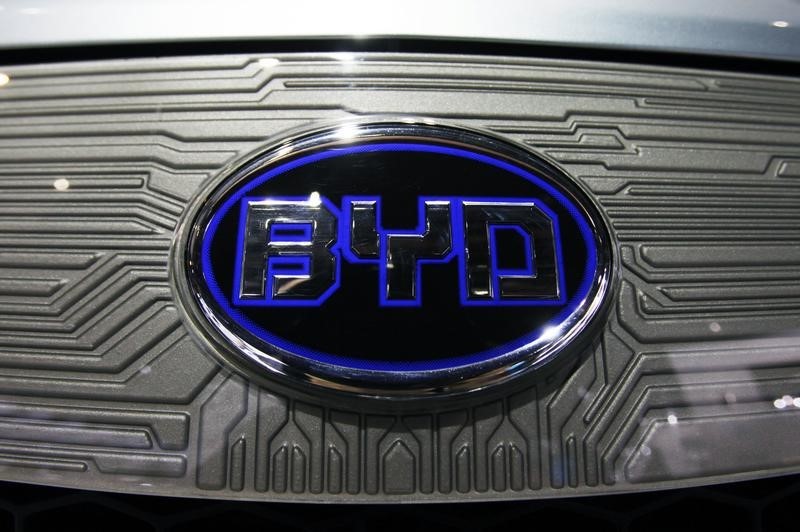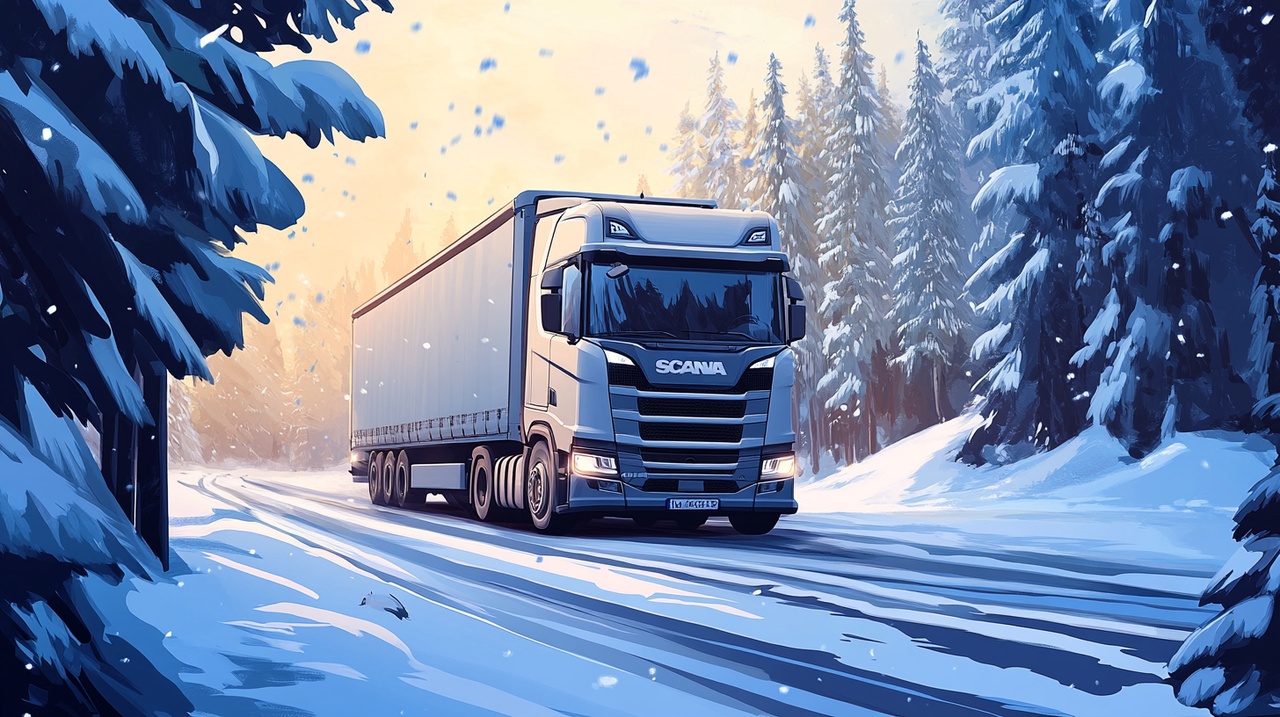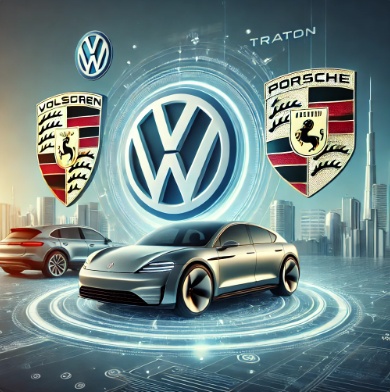Good morning! Yesterday I attended the TRATON ($8TRA (-0.83%) ) analyst conference on the results for 2024 and the outlook for 2025.
At the beginning, Christian Levin (CEO) gave an overview of the highlights of the fourth quarter and the current demand situation, while Michael Jackstein (CFO) went into more detail on the key financial figures. Both also presented the outlook for 2025.
Christian Levin was extremely extremely proud of the 2024 results, which were achieved despite declines in the key markets of Europe and North America. Particular emphasis was placed on the increase in sales and the exceeding of the target of an adjusted return on sales of 9% to 9.2% was particularly emphasized.. Vehicle deliveries of 334,000 units in a declining market also pointed to market share gains in most regions. market share gains in most regions and for most brands. The total sales reached a record 47.5 billion euros .. Particularly positive was the strong cash flow in the fourth quarter which increased the cash flow for the year as a whole to 2.8 billion euros.. The earnings per share (EPS) also grew significantly from EUR 0.47 to EUR 1.49 in the fourth quarter, resulting in full-year EPS of EUR 5.61. Consequently, a higher dividend payment is planned for 2024.
Levin then gave examples of how the various brands are increasing TRATON's shareholder value. Scania achieved record sales and earnings and delivered more than 100,000 vehicles for the first timedespite macroeconomic and geopolitical challenges. This was due to the the resolution of many supply chain issues and a stable production flow possible. In addition gained market share in Europe and Latin Americawhich proves the the superior quality of the Scania Super driveline. powertrain. The share of Super sales in total 13-liter truck sales increased to almost 70% in the fourth quarter, with a target of 100%.
MAN delivered its first all-electric heavy-duty truck in the fourth quarter and is preparing and is preparing for series production. At the same time, MAN continued to work intensively on cost efficiencyto counteract weaker customer demand and price pressure in Europe, particularly in Germany.
With regard to battery electric vehicles (BEVs) progress has also been made. MAN is preparing for series production of its heavy-duty e-truck and Scania is expanding its range of e-trucks. The order intake for electric vehicles was promising at around 1,500 units in the fourth quarter. Declines in deliveries are partly due to supply chain problems and the phasing out of the MAN e-Van as well as temporarily reduced e-bus deliveries. Although the current BEV figures are still low, TRATON firmly believes in the electric future and is committed to expanding the charging infrastructure and the availability of green electricity.
TRATON Financial Services made significant progress in expanding its offering, particularly MAN Financial Services. MAN Financial Services were implemented in the UK and Ireland in the fourth quarter and the rollout in Germany was completed. By the end of 2024, the financial services were rolled out in 9 of 14 planned countries. MAN Financial Services has already achieved a penetration rate of over 40% in Polandwhich underlines the importance of integrated financial services.
Despite challenging markets, the sales figures remained stable. In Europe fewer trucks and buses were delivered in the fourth quarter than in the previous year, but the highest quarterly sales of the year were achieved with 37,000 vehicles. In the USA deliveries were also down in the fourth quarter, but International performed well in the specialty vehicle segment and recovered in the bus business. In Mexico all three brands (Scania, Volkswagen Truck & Bus and International) benefited from a pull-forward a pull-forward effect due to the introduction of Euro VI. In South America Scania and Volkswagen Truck & Bus showed a very strong performance with a 30% increase in vehicle deliveries in the fourth quarter. in the fourth quarter. The order intake for trucks in Europe rose by more than 40% in the fourth quarter and reached the highest level since the first quarter of 2023 with over 25,000 vehicles. This positive trend continued in January and February. Around 60% of this growth was driven by Germany, France and Poland. In North America, incoming orders fell by more than 40% in the fourth quarterwhich, however, must be compared with a very strong fourth quarter of 2023. In South America, incoming truck orders rose by almost 20% in the fourth quarteralthough there are signs of a slowdown in market momentum in Brazil.
In the subsequent question and answer session analysts asked detailed questions on various aspects of the results and the outlook.
Daniela Costa from Goldman Sachs asked about the price assumptions in the margin guidance for 2025the the impact of China investments and the increased EV investments. Michael Jackstein explained that the different order situation at the beginning of 2024 compared to 2025 was a key factor. The well-filled order books at the start of 2024 would have enabled better prices. The situation in Europe, particularly in Germany, is weighing on MAN.. The start-up costs for the plant in China will have a slight impact on Scania's margin. Costa also asked about the expected expected production development at MAN, Scania and International. Christian Levin explained that, due to increased demand in Central Europe, MAN will end will end short-time working from April and ramp up production again. Scania has already reduced production in Europe twice and found a good balance, while production in Latin America continues to run at full speed. production in Latin America continues to run at full speed.
Klas Bergelind from Citi came back to North America and asked about the reluctance of the larger fleets and their assessment regarding a possible repeal or changes to the EPA27 requirements in light of the worsening economic outlook in the US following the tariff news. Christian Levin reiterated the that the EPA27 legislation will remain in place and that TRATON is and TRATON is developing the appropriate products. The The reluctance of the large fleets is mainly due to the uncertainty surrounding the US economy. Bergelind also asked about the the development of average selling prices (ASP)and whether the softer ASP at Scania was more due to the mix, while at MAN there was more price pressure. Michael Jackstein explained that both price and product mix were positive in 2024 and thanks to the new CBE engine and good fuel efficiency, prices could be kept stable He pointed out the impressive share of Scania Super sales and the introduction of this engine also at International and MAN. The Vehicle Services business is developing very well and making a positive contribution to the margin. Christian Levin added that TRATON, if necessary, plays with the content of the offer (financing, maintenance contracts) rather than lowering the vehicle price. In response to a question from Bergelind as to whether the price pressure at MAN was more due to the fleet mix, Ursula Querette confirmed this.
Nicolai Kempf from Deutsche Bank asked about the tariffs and whether the S13 Powertrain would be manufactured in the USA or Mexico or imported from Europe. from Europe. Michael Jackstein explained that the S13 will be produced in the USA (Huntsville, Alabama) and then delivered to the plant in Mexico (Escobedo). Kempf also asked about the expectations regarding the impact of the new government program in Germany (infrastructure, military). Michael Jackstein emphasized the importance of a new government that acts quickly and expects positive effects on the economy through infrastructure and military spending. He also pointed out the the need for a changed regulatory landscape in Europe to to support decarbonization through appropriate incentives. Christian Levin agreed and sees positive signs of movement in Germany after years in which competitiveness was taken for granted. He hopes that Germany could set an example for Europe with its deregulation efforts.
Erik Golrang from SEB asked about the the development of the service business and the aftermarket, particularly in Europeand whether a similar development to the order intake could be observed here. Christian Levin reported a very very good development of the service business at Scania and MAN.. Investments in connectivity and the use of customer data had helped to generate more sales than the pure increase in the vehicle fleet. In the future, he expects further growth through proactive maintenance contracts and the acquisition of dealerships and workshops.
Michael Aspinall from Jefferies asked about the relationship between the free cash flow (guidance 2.2 to 2.7 billion euros) and the dividend (approx. 850 million euros) and whether there will be similar negative "other" items as in the previous year in order to plan the reduction of net debt. Michael Jackstein explained that the cash flow guidance was realistic despite lower margins compared to 2024as an improved working capital management is expected. The "Other" item in the previous year had mainly FX effects of net financial debt and effects from IFRS 16 included.
Aspinall also asked about the reasons for the the increase in incoming orders in Europe and what types of customers are ordering. Christian Levin saw a positive dynamic due to customers' wait-and-see attitude, the stabilization of interest rates and the need for replacement investments due to the age of the vehicle fleets. The orders came from fleet operators and small customers from various regions of Europe, with the UK being an exception. Michael Jackstein added that added that lower interest rates and the high average age of truck fleets in Europe are supporting this development.
Shaqeal Kirunda from Morgan Stanley spoke again about the North American market for heavy trucks and asked about the discrepancy between TRATON's more cautious assessment and the assumption of some competitors that the market has bottomed out. Christian Levin confirmed that the Christian Levin confirmed that incoming orders in January and February did not show the expected recoverywhich had led to a more cautious forecast. The customers were hesitant and were waiting for clarity on interest rates, inflation and customs duties. However, he believes that EPA27 will lead to a prebuyeven if this may be delayed due to the uncertainties. Michael Jackstein added that the strong business in the commercial and medium-duty segment in North America is normalizing or cooling off.
Despite a difficult market environment, the TRATON Group achieved solid results in 2024 and achieved solid results and exceeded its profitability targets. The The focus remains on increasing efficiency by integrating the brands, particularly in the area of research and development with the modular system.
The outlook for 2025 is more cautiousas ongoing challenges in Europe and North America and start-up costs for strategic projects such as the plant in China are expected. Nevertheless, TRATON is optimistic for the long term and is focusing on strengthening its market position through innovative products and services and expanding its high-margin service business.
I am curious to see which of the truck manufacturers will perform best in the future. I completely miss the discussion about self-driving trucks at Traton, which makes me feel a little negative. What do you think?




















